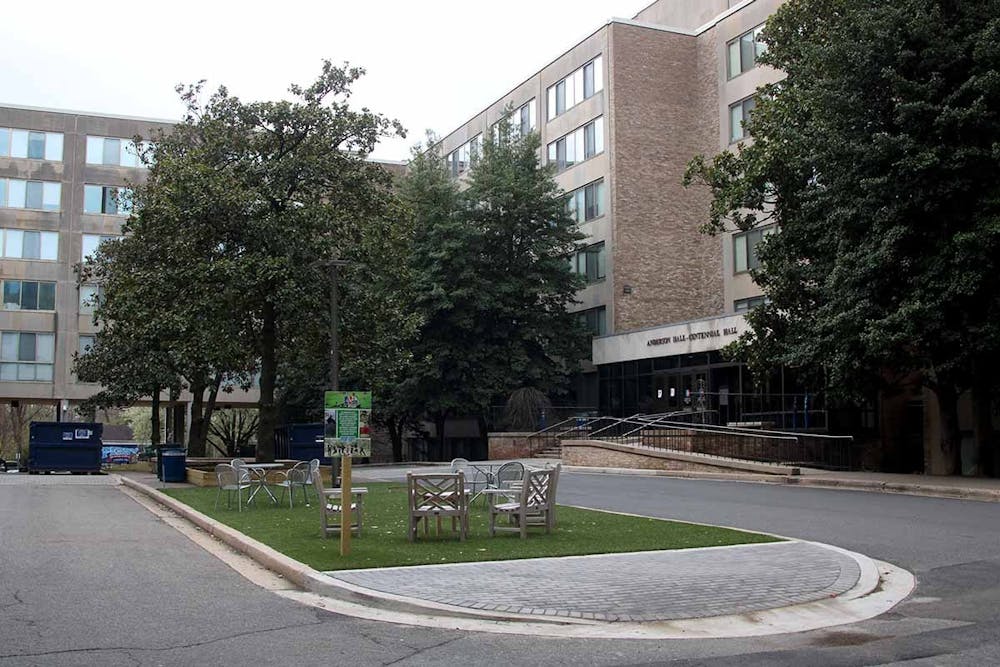Editor’s note: This article originally appeared on theeaglecoronavirusproject.com, a separate website created by Eagle staff at the onset of the coronavirus pandemic in spring 2020. Articles from that website have been migrated to The Eagle’s main site and backdated with the dates they were originally published in order to allow readers to access them more easily.
When American University announced its Mid-Semester Residential Experience to begin in early March, it allotted about 1,250 slots for participating students, a significant portion of an undergraduate population of over 7,400.
Vice President of Campus Life and Inclusive Excellence Fanta Aw said that approximately 549 students decided to participate.
Many who chose not to return to campus said that remote learning over the past semesters has helped them save money, and moving to on-campus housing would unduly burden them financially.
“I decided not to do the mini-mester because I felt like it wasn’t worth it,” said School of Public Affairs freshman Ellen Schoenberg. “My family is saving a lot of money this year from virtual school, so I didn’t want to have to pay more just to stay online in a different city.”
Students choosing to move on campus will be charged $2,478 for housing in the on-campus dorms, along with $1,588 for a meal plan of 100 meals, and $400 worth of EagleBucks.
SPA freshman Jada Barrett believes fewer students are moving on campus than the University planned for due to many first-year students finding cheaper housing off campus, which they feel gives them more freedom.
Barrett agreed with Schoenberg, citing financial concerns as a primary factor in her decision.
“I do not see a lot of students being able to justify spending such a large amount of money just to live at AU for a few weeks,” Barrett said.
Aw said that the proposed 1,250 slots was a conservative cap, and that AU only expected about half that number to register.
She noted that AU had designed a variety of scenarios for how many students decided to attend.
“When we were planning for the Mid-Semester Residential Experience, 1,250 was the maximum, for health and safety purposes, that we could accommodate,” Aw said.
Students who did choose to participate said that they are hoping to improve on their productivity and educational experience while on campus, a markedly different learning environment from their childhood bedrooms and dining room tables.
The pandemic and remote learning have posed several challenges to students who were forced to stay home.
“Quarantine with online school has presented difficulties for me and my family,” said Tiffany Kalota, a freshman in SPA. “My parents recently moved into a smaller house because we thought I would have moved out. Now, I am sharing a room with my sister.”
Kalota, along with many others, struggled finding a conducive space in their home to work. She hopes that living in a dorm at AU will give her the necessary space to have a more stable semester.
Isabel Thompson, a sophomore in the School of International Service, had her first year upended in March 2020, when AU sent students home and moved fully online. After spending her fall semester at home, she’s excited to return to campus in a month.
“I need time to be a college student on my own terms,” she said. “I am excited to see some friends that have their own apartments in the city.”
AU put strict coronavirus guidelines in place, which the administration believes will keep students and community safe. Students living on campus will be required to receive two PCR tests a week, with results coming back within 12-24 hours, according to Aw. AU will also require that students traveling to D.C. submit a negative test beforehand.
Aw is confident that the requirements set in place will allow for a successful experience for students.
“We need a comprehensive approach to health and safety,” she said. “Among that approach starts with the basics: masking, physical distancing, good hygiene.”
The administration is hopeful that the experience will allow participants to build a connection to the city and campus; however, they stressed that the health and safety of the community is the number one priority.
“We want to make sure that people understand that it takes all of us to feel safe,” Aw said. “This really needs to be a community commitment.”
The move-in date for the program starts on March 4, and lasts for 10 days.





